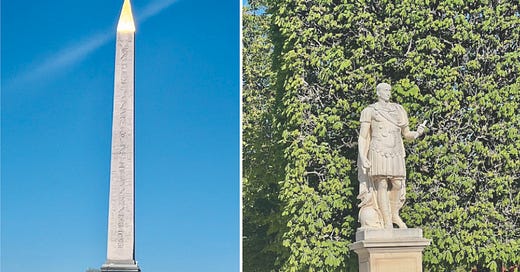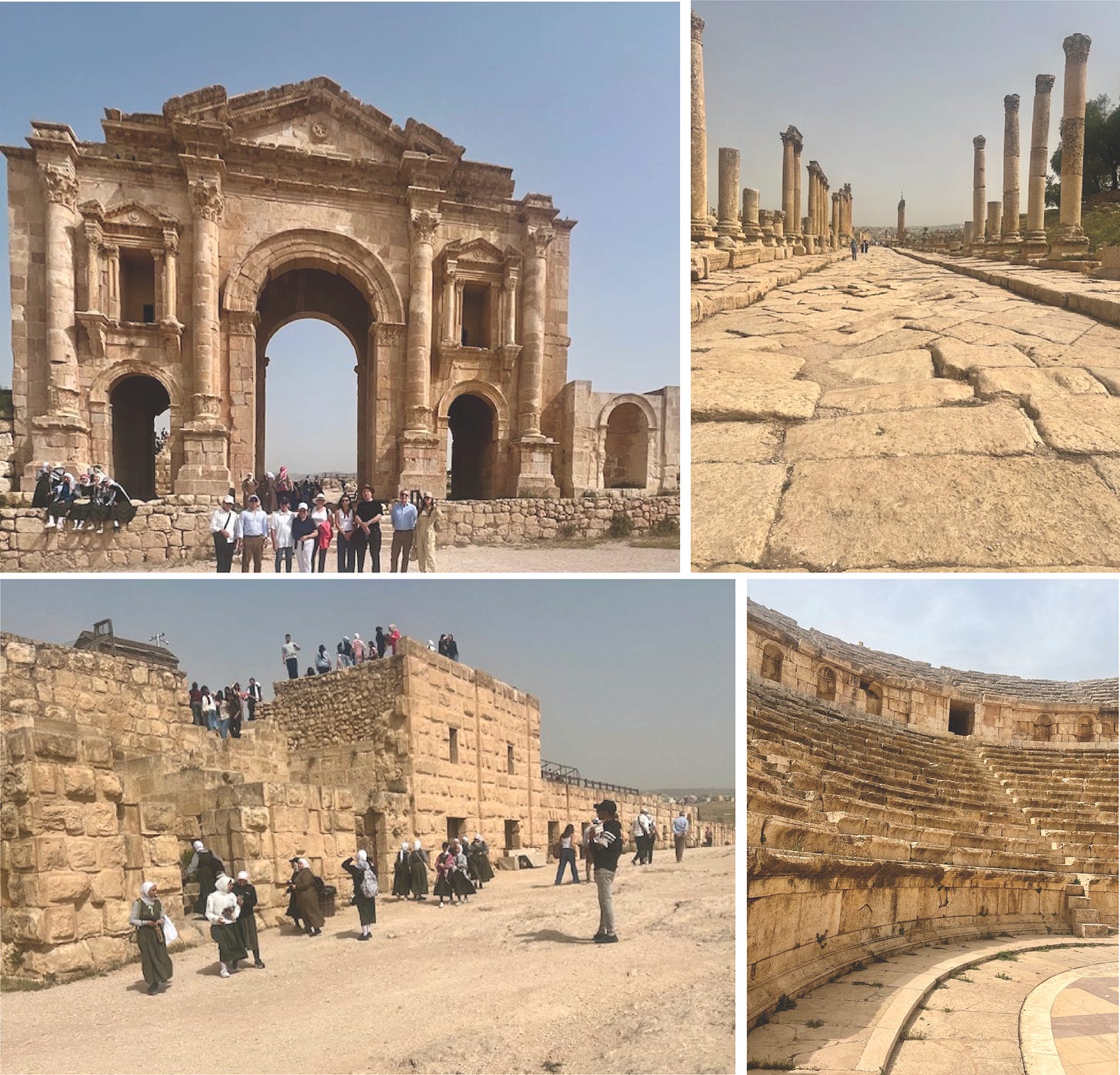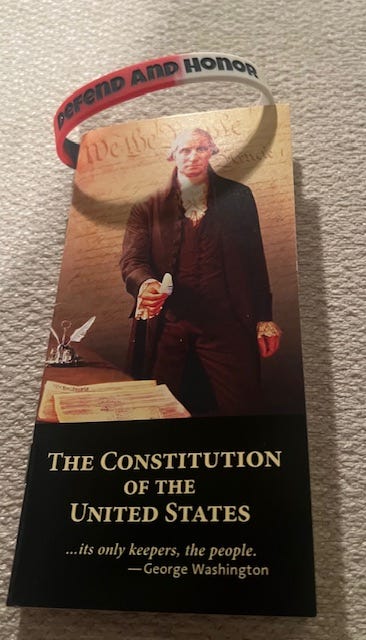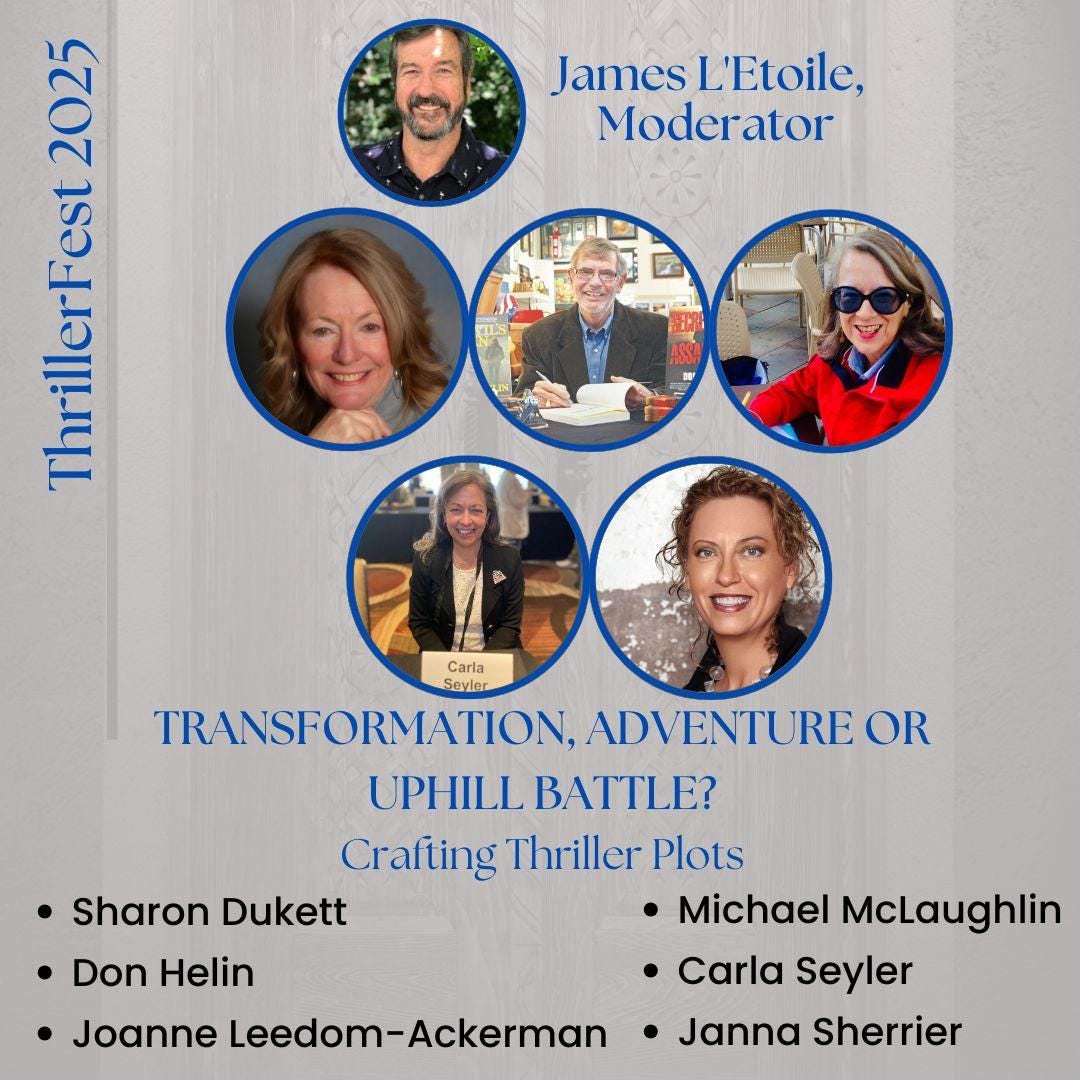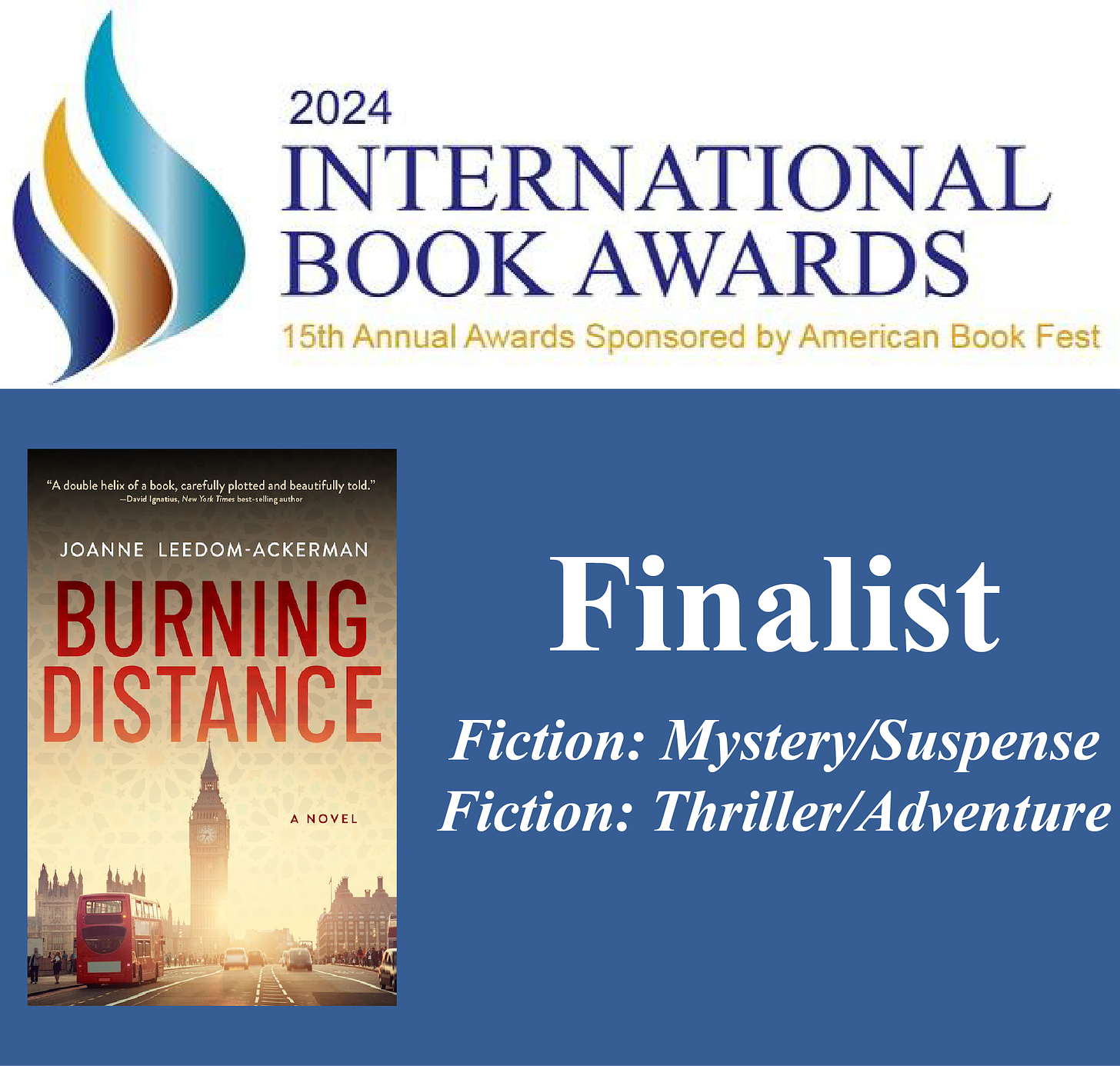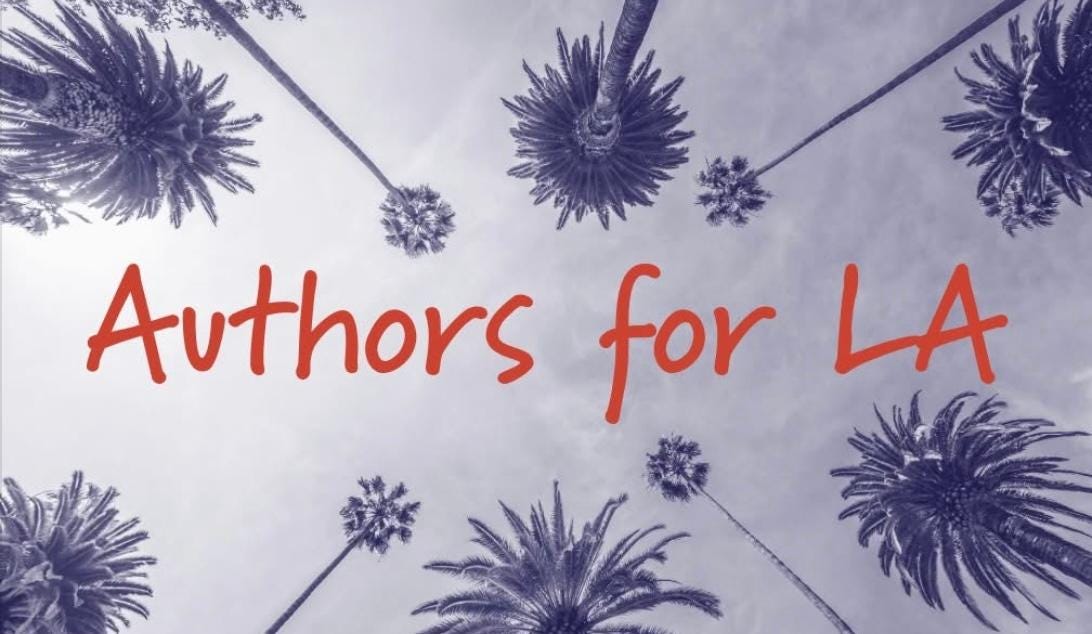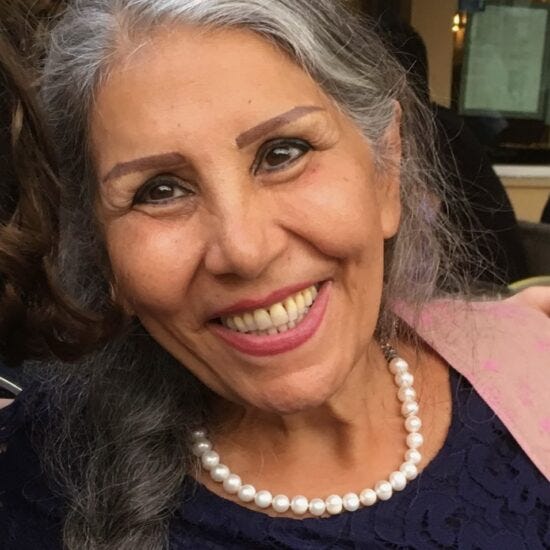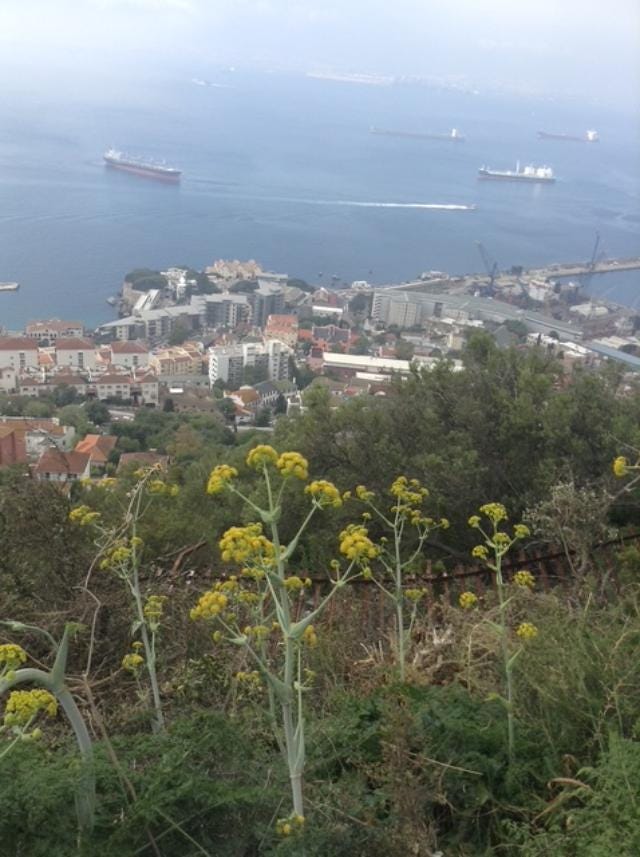Searching for Place de la Concorde
Dear Friends,
Welcome to May’s Substack.
I hope you’ll enjoy this month’s blog Searching for Place de la Concorde. The audio version is available by clicking the link in the blog or clicking the link here for all podcasts. https://joanneleedomackerman.substack.com/podcast
Book News announces the paperback publication of my novel The Far Side of the Desert, some new podcasts, radio interviews, and other news. I’ll be at the Annapolis Book Festival May 3 and in Dallas May 22.
The Writers at Risk section focuses on the case of Iranian poet Mahvash Sabet.
The Books to Check Out section celebrates Peter Godwin’s beautifully written memoir Exit Wounds and Burhan Sönmez’ provocative Lovers of Franz K.
In the Scene section you’ll find a photo, along with text from The Far Side of the Desert, and in Words of the Month a couple of words you may not use but might like to know.
I look forward to meeting new and current readers at events and online. Even if you’ve read the hardcover of The Far Side of the Desert, I hope you’ll share the paperback with friends. Thank you to everyone who’s come to bookstores, libraries, book clubs and online for both my latest novels Burning Distance and The Far Side of the Desert.
If you’re interested in having me speak at a venue or with a book club, click here. Thank you too for reading and sharing this free monthly Substack On the Yellow Brick Road. I hope you’ll stay in touch!
Searching for Place de la Concorde
I walk through the Tuileries Garden on a sunny Sunday morning in Paris with all the celebratory marble gods and generals along the broad path, with flowers and children and families, with the Musée de l’Orangerie and Musée du Louvre nearby and the Place de la Concorde (Harmony Square) ahead.
The 19-acre Place de la Concorde is the largest public square in Paris with the majestic Luxor Obelisk at its center and a view of the Arc de Triomphe and the Eiffel Tower in the distance and statues of Hercules, Caesar, Theseus Fighting the Minotaur, Artemis with a Doe, A Tigress Carrying a Peacock and many other figures filling the landscape. The fountains and ponds sparkle in the sun which shines on these relics of a fraught and troubled history that has now settled into a sightseers’ bonanza.
On this very ground a mere 232 years ago were the public executions by guillotine of King Louis XVI, Queen Marie Antoinette, and eventually of Maximilien Robespierre, along with a thousand more during the French Revolution’s Reign of Terror in 1793-1794. The square was named Place de la Révolution at the time, but after the revolution, as a gesture of reconciliation, its current moniker was adopted. Surrounding Place de la Concorde are now luxury hotels and buildings of state.
From this majestic city with its history now enshrined as tourist attractions, I move on to Amman, Jordan where I join others in a fact-finding, listening journey with the International Crisis Group into the unsettled situation in the nearby countries of the region. Here history harks back many millennia, all the way to the Bronze Age and to places like the ruins of Jerash which remind current tourists, of which there are fewer these days, of the fleeting notions of time and politics. Unfortunately, the latter has a grip on the region that seems difficult to loosen and resolve.
Our discussions with former ministers and current journalists and scholars fixed on the seemingly intractable struggle between Israel and the Palestinians, with an additional focus on the future of Syria. There are glimmers of hope in the talks, but these are few and just bare glimmers, though one grasps onto them and probes how they might be developed and expanded to light a path forward.
This blog is not sufficient for that fuller discussion except to note that as one observes and walks through history, the path does at times open in unexpected ways, though often there is brutal conflict before that opening occurs. Everyone we meet with is still talking and looking for a way to find that path.
Back in the U.S. where I live in Washington, DC, the body politic is in its own struggle and is as stirred and upended as I can remember in my lifetime. Protests and court challenges unfold weekly, if not daily, in the concern that an authoritarian wind is sweeping though with actions taken outside of legal bounds.
My few weeks away put in some perspective the fraught history that has come before and emphasizes that Place de la Concord (Harmony Square) cannot be taken for granted.
Conflicting and opposing views of citizens and leaders have always challenged, but over time societies have found that through compromise, institutions, laws, respect for fellow citizens they can progress and find a way to exist in spite of differences and even advance because of these. Retribution is not an engine for a just and fair society. Respect for the individual and for the law allows differences to resolve and dissent to breathe and disagreements to resolve nonviolently.
Concerned about how to respond and speak up to the rapid and often seemingly illegal changes taking place, one friend who has lived in the political arena most of her life took a small step of her own. She ordered paperback copies of the U.S. Constitution then created and ordered red, white, and blue rubber bracelets that say: “Defend and Honor Your Constitution.” She carries these with her for any political discussion or debates which erupt; there are more and more these days. Trying not to get swept up in the rancor of the moment, she quietly hands out the Constitution, urging her fellow citizens to read and remember the provisions of this document which has been a model for the world over, then she hands out a bracelet. I’ve been wearing my bracelet ever since.
“…Under the empires of old, the strong did what they willed and the weak suffered what they must.
But over the centuries, people built the sinews of civilization: Constitutions to restrain power, international alliances to promote peace, legal systems to peacefully settle disputes, scientific institutions to cure disease, news outlets to advance public understanding, charitable organizations to ease suffering, businesses to build wealth and spread prosperity, and universities to preserve, transmit and advance the glories of our way of life. These institutions make our lives sweet, loving and creative, rather than nasty, brutish and short….”
—David Brooks, Column in New York Times, April 17, 2025
NYT Article by Ryan Holiday, April 21, 2025:
The Naval Academy Canceled My Lecture on Wisdom
How a lecture to the U.S. Naval Academy on censorship was censored.
Roughly an hour before my talk was to begin, I received a call: Would I refrain from any mention in my remarks of the recent removal of 381 supposedly controversial books from the Nimitz library on campus? My slides had been sent up the chain of command at the school, which was now, as it was explained to me, extremely worried about reprisals if my talk appeared to flout Executive Order 14151 (“Ending Radical and Wasteful Government D.E.I. Programs and Preferencing”).
When I declined, my lecture — as well as a planned speech before the Navy football team, with which my books on Stoicism are popular—was canceled…
The paperback of The Far Side of the Desert published April 15 from Oceanview Publishing. I hope you’ll order, read and enjoy. If you’ve already read the hardcover, I hope you’ll buy the paperback and give to friends!
I also hope you’ll tune in to upcoming radio and podcast interviews listed below.
I’ll be at the Annapolis Book Festival May 3 on a panel about international fiction, in Dallas at Interabang Books May 22 interviewing a new author and June 21 on a panel at ThrillerFest. (Schedules below.)
“A thoroughly enjoyable read. I hesitate to call The Far Side of the Desert a page turner, but only because it’s so much more, with characters that will stay with you long after you finish.”
—James Grippando, best-selling author of Grave Danger, Code 6, and The Big Lie
Upcoming Interviews, Podcasts and Events:
Thursday, May 1, 2025
Conversations with Vicki St. Clair
KKNW AM1150 & FM 98.9HD3, Seattle
(taped-link will be provided when published)Saturday, May 3
Monday, May 5
The Culture Buzz, KFMG 98.9 FM
(taped-link will be provided when published)Tuesday, May 6
OPEN AIR, KBOO Radio, Portland, OR
(taped-link will be provided when published)Wednesday, May 7
The Round Table
WAMC Productions/ NPR - Albany, NY National
(taped-link will be provided when published)Thursday, May 22
-Writers' Voices, Podcast
(taped-link will be provided when published)-Interabang Books, Dallas, in conversation with Maya Blue
6:00pm-7:00pm
Saturday, June 21, 8:00am-8:50am
Panel Discussion: "TRANSFORMATION, ADVENTURE, OR UPHILL BATTLE? Crafting Thriller Plots"
Thrillerfest
The Regent Room, 2nd Floor
New York Hilton, Midtown
1335 6th Ave
New York, NY 10019
Burning Distance (Oceanview Publishing, 2023 and paperback in 2024) was honored by the 2024 American Book Fest International Book Awards as a Finalist in the Best Mystery/Suspense and Thriller/Adventure categories.
“I was immediately engrossed in the lives of Joanne Leedom-Ackerman's characters and their fascinating and compelling stories. Joanne has the ability to take the big issues of contemporary life (including the clash of cultures and a remarkable grasp of the weapons trade) and render them in the contexts of love, conscience, and the consequence of choice. She reminds us as did Donne that we each are a piece of the continent, a part of the whole of humanity, and that no matter how difficult the time, that love and peace and hope can be realities rather than abstracts."
—Eric Lax, author of Faith Interrupted
I was glad to be part of the Authors for LA Auction which has raised funds for the Red Cross in support of writers and others in the Los Angeles fires. Funds are still needed and a list of where you can donated is at the end of the blog in my February 2025 Substack.
Thank you to all who have come together and shared readings and conversations around my novels in 2024.
Selected recordings of past events and interviews:
Interview with Janeane Bernstein on NPR’s KUCI, Get the Funk Out!
Book Launch for Akram Aylisli's People and Trees with Plamen Press
Why Baldwin Matters Series, The Alan Cheuse International Writers Center
Malaprop’s Bookstore and Café in Asheville, NC
Kinokuniya Bookstore in New York City with Salil Tripathi
Baum on Books on WSHU Public Radio
Interview with Anna Roins of Authorlink
Interview with Deborah Kalb
For more podcasts, videos and interviews, click here
Mahvash Sabet (Iran)
(Sources include PEN International, English PEN, Radio Free Europe/Radio Liberty, Amnesty International, CNN)
… If I have not died here it is because
they cannot take from me what I shall never lose.
–Mahvash Sabet
Poet, teacher and member of Iran’s persecuted Baha’í religious community, Mahvash Sabet has been in and out of prison for her beliefs for more than 20 years. She is currently serving a 10-year sentence on charges of “espionage” for her contact with foreigners and for her practice of her faith.
Formerly imprisoned for a decade because of her religious beliefs and her leadership in the Baha’í community, Mahvash Sabet was one of the Baháʼí 7, otherwise referred to as the Yaran or Friends, an informal group striving to address the needs of the Bahá’í community after the Islamic Republic of Iran banned Bahá’í institutions.
Before the Iranian Revolution, Ms. Sabet worked as a teacher and as a principal at several schools, but after the revolution, she was barred from working in public education due to her faith and became the director of the Bahá’í Institute for Higher Education.
In June 2010, she and the rest of the Baháʼí 7 were given sentences of 20 years in prison. Sabet was represented by Shirin Ebadi during her trial, who said there was "not a shred of evidence" for the crimes which they were charged with.
In Evin prison she was confined to a 13-by-16-foot shared cell with windows covered by metal. She slept on a cement floor with a small blanket and was said to be subjected to interrogations, torture and solitary confinement.
In prison she began writing poetry on scraps of paper, napkins, and paper towels, which she slipped to family members during their visits. Eventually a family member in England translated her poems. In 2017 her first of three books of poems—Prison Poems—was published. That same year PEN International gave Sabet the "International Writer of Courage" award. Austria and Danish PEN welcomed her as an honorary member; she is now also an honorary member of English PEN.
In 2017 Sabet’s 20-year sentence was commuted, and she was released, but then she and others were re-arrested in 2022 for "participating in groups to act against national security through teaching and preaching the Bahá’í faith to children in kindergartens, [and] agitating against Islamic Sharia through holding coaching courses." On November 21, 2023 she was sentenced to another ten-year prison sentence after an hour-long trial. According to her daughter who has since moved to Australia, she has been beaten during interrogations and kept in solitary confinement for 42 days and is suffering ill health.
The Bahá’í faith, founded in the 19th century in Persia with millions of worldwide followers including 300,000 in Iran, is monotheistic and focuses on the spiritual unity of humanity. Because its founder, Baha’u’llah, declared himself to be a prophet of God, Iran’s Shiite clerics view the faith as blasphemous. Muslims believe the Prophet Mohammed was the last prophet.
Sabet has said, “I am a Bahá’í and Bahá’ís are encouraged not to think of people as enemies. They are urged not to harbor resentments or bear grudges towards others. … They should strive to see something they love and to respect every soul. Do I strive for this ideal? I do not always succeed, but I try.”
What are they doing to us in this perilous place,
this prison of loss?
But what can they do to a handful of dust
in the middle of chaos?
If they cut open our veins, red tulips will blush
like blood in the fields.
If they padlock our lips, the mouths of a thousand
spring buds are unsealed.
Sabet has said, “Writing became my means of survival.”
And I said to myself,
‘Are you less than a weed then?
Where’s the life in your roots gone?
Where’s growth in your leaves? Your stem? No stirring in you at all? For shame!
And at that I felt a surge of the sap
Of spirit blaze within.
Sabet is said to keep a pen and notebook with her and writes every day in prison. She has said that words allow her to cleanse “the rust off my heart and recover the strength of my soul.”
To Take Action for Mahvash Sabet:
You can note grave concern about Mahvash Sabet’s well-being and call for her immediate release and for her conviction to be quashed.
In a letter or email to the Iranian embassy in your country, you can express concern about Mahvash Sabet and also concern about the persecution of Bahá’ís in Iran.
Contact your country’s ambassador to Iran and ask them to raise Sabet’s case with the Iranian authorities.
(Addresses of Iranian embassies in your country can be found here.) If there is not an Iranian mission/embassy in your country, you can send your letter and emails to the Iranian Ministry of Foreign affairs here.
Please send messages of solidarity to Mahvash Sabet
An attack on a writer, the shutting down of a publishing house, the torching of a newspaper reduce the space in the world where ideas can flow. Freedom of expression is vital to writers and to readers but is challenged daily around the world. Listed here are organizations whose work on human rights and in particular issues of freedom of expression I’ve been engaged with directly and indirectly over the years. Some of the organizations have broader agendas, but all have contributed to keeping space open for the individual voice.
PEN International (with its 147 centers in over 100 countries)
PEN American Center
English PEN
PEN/Faulkner Foundation
Human Rights Watch
Amnesty International
Amnesty International USA
International Freedom of Expression Exchange (IFEX)
Committee to Protect Journalists (CPJ)
Article 19
Index on Censorship
Poets and Writers
Authors Guild
International Center for Journalists
I’ve had the privilege of working in PEN with both of the authors featured here. I served on the board and as a Vice President of PEN American Center when Peter Godwin was president and continue to serve as a Vice President of PEN International in Burhan Sönmez’s term as International PEN President. Both authors are also human rights lawyers, raised in countries with questionable human rights records—Peter in Zimbabwe and Burhan in Turkey. Burhan, a Kurdish Turk also spent time in prison. Their authentic and creative voices shine through in these two different books—Peter’s Exit Wounds is a beautiful memoir and Burhan’s Lovers of Franz K is a provocative novel set as a dramatic dialogue.
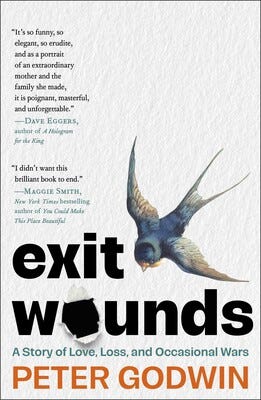
I sometimes recommend listening to a book as well as reading it on the page. Exit Wounds: A Story of Love, Loss, and Occasional Wars, read by its author, is such a book—a memorable experience in both print and audio. Among its themes, the book explores language and its role in establishing class and place. Peter Godwin is able to render the nuances of words, both in inflections of his voice and in the alliteration and rhythm of words on the page.
Exit Wounds tells a dramatic and heart-felt story of a boy and man’s journey through life, bookended by women—his mother and his wife—and explores themes of belonging, war, marriage, parenting, career, all wrapped around the age-old question of identity. His ambivalent relationship with his mother, who is at the end of her life, and his ultimate divorce from his professional and society wife after 18 years are poignant, witty, and compelling to the reader who has joined his journey of seeking— if not peace, at least some enlightenment.
Because of security issues where his parents lived in Zimbabwe and where his mother was a doctor serving anyone who came to her, Godwin was sent to a nearby boarding school at the age of six. Living through the turmoil of his nation’s fight for independence from Britain, his own service in the Rhodesian army as a young man “on the wrong side of a losing war,” his decade as a correspondent covering wars, his work as a human rights lawyer and as an award-winning author (When a Crocodile Eats the Sun), his pleasure as a parent, Godwin takes readers along on this intimate trip and leaves us if not wiser, at least aware of a larger world and grateful for the skill and craft of our guide.
From Exit Wounds:
One day she knelt in front of me, her eyes level with mine, and she told me that what she really needed was for me to be a “big boy,” to be independent and “grown-up.” And so I was. Because I wanted to please her, to earn her love. But of course, her goal was to no longer have to pay attention to me, to no longer need to worry about me, so that she could do her real job, her vocation. I was proud of her, and I understood that she had more important things to do than to take care of me. I was a loyal child.
Then the war came to Chimanimani, heralded by the death of our next-door neighbor, ambushed up near Skyline Junction by a guerrilla group called the Crocodile Gang. My parents sought special permission from the Ministry of Education for me to board at school. I was six, two years younger than any other boarder, and small for my age. Bullied and homesick, I cried myself to sleep each night and began wetting my bed. I drew a prison-style calendar and taped it to the inside of my metal locker door, crossing the days off until the first permitted parental visit—an exeat—six weeks later.
When my parents arrived—late—in their dusty ivory Austin Westminster, I was ready, my black tin trunk with GODWIN stenciled on it in white capitals, all packed. I ran to the car, dragging the trunk behind me, wrenched open the car door, leapt in, and burst into tears, begging to go home.
It never occurred to me that once they saw how unhappy I was, my parents might make me stay. But they did. The war made it too dangerous to do otherwise, they tried to explain over tea and rusks in the Chimanimani Hotel lounge.
I can remember every detail of their departure later that day. The cawing of the crows in the cypress trees, the evening breeze picking up off Green Mount, the precise way the taillights of the Austin glowed briefly red as my father braked and then accelerated away past the banks of morning glories and into the gloaming. In that moment, I understood that I was really on my own.
From then on, I was raised in uniform, in boys-only institutions, boarding schools further and further away from home (followed by the army, and even a males-only Cambridge college). At school I became almost feral, going for months without a one-on-one conversation with an adult.
And I never really trusted my parents again.
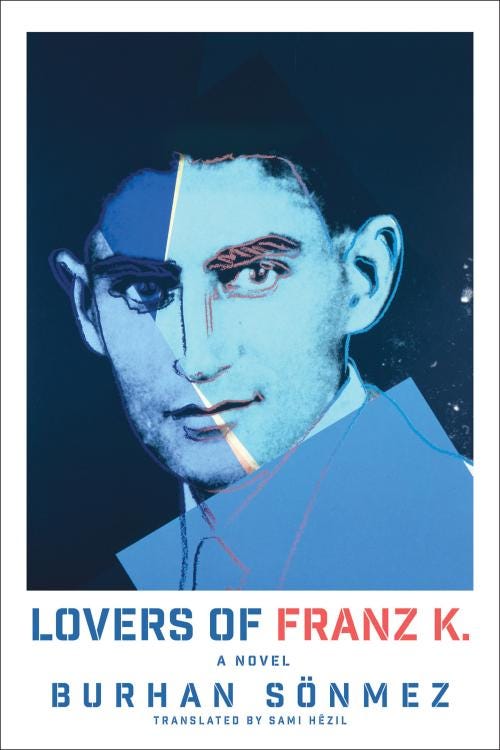
Lawyer and artist engage in a philosophical debate in Burhan Sönmez’s Lovers of Franz K, set largely as dramatic dialogues between artist/activist Ferdy Kaplan—avid fan of Franz Kafka, and Commissioner Muller, the Prosecutor and the Judge. Kaplan has been arrested for murder, an accidental murder of a student. He was aiming for another writer Max Brod, executor of Kafka’s estate. Against Kafka’s wishes to destroy his work, Brod has had it published. Kaplan apologizes to the parents of his victim then takes on the philosophical premise of his actions and the rights of the writer.
Set in Berlin among student protests in the 1960’s in Europe with echoes of the Second World War still sounding, Lovers of Franz K takes the reader back to the wrenching days of the war and forward into a future still uncertain with the Berlin Wall now dividing Europe, women fighting for rights, and Israel acting as a bulwark against lingering antisemitism.
Lovers of Franz K is a mystery about who really instigated the attack on Max Brod, what forces are at play behind the scenes. Only 130 pages in a small format, Lovers of Franz K delivers a big impact and a surprising and satisfying ending.
From Lovers of Franz K:
FERDY KAPLAN: “You are searching in the wrong place. You are not even trying to look in the right place.”
PROSECUTOR: “Where should we look, Mr. Kaplan? You wounded a writer and you killed a student. Where else should we look?”
FERDY KAPLAN: “It is as if I’m leading this hearing, not you! If I stop speaking, you will be stranded, marking time.”
PROSECUTOR: “I don’t think so at all. When you tried to run away at the scene, we apprehended you and brought you here. We found the Nazi roots in your past. We searched the connections of your parents. We obtained information about you from Istanbul. We put the case within a framework.”
FERDY KAPLAN: “This framework is founded on nothing. If you could look at it from any distance, you would understand, but you prefer to believe in meaningless stories.”
PROSECUTOR: “What is wrong with these stories? During the war you were in Berlin. You were taken by your family to Nazi rallies. You grew up with that enthusiasm and pride.”
FERDY KAPLAN: “These are the parts of my life that have long been forgotten.”
PROSECUTOR: “You may have forgotten, but you were reminded all your life in Istanbul. There you encountered hostility toward foreigners, you were assaulted, you were humiliated, and as a result, your faith was reawakened.”
FERDY KAPLAN: “You are drawing the wrong conclusions from real events.”
PROSECUTOR: “In my opinion, you took the wrong path due to certain events. Those events reconnected you with past memories, and now you have decided to create a future that your parents couldn’t achieve.”
FERDY KAPLAN: “That’s enough—”
PROSECUTOR: “When you heard the truth—”
FERDY KAPLAN: “I have not heard a single true word from you. You are trying to put your lies in my mouth.”
PROSECUTOR: “Why are you agitated?”
FERDY KAPLAN: “I defend the things I have done, but you are asking me to become someone I am not, you are forcing me to wear a straitjacket.”
Sharing here image and passage of text from The Far Side of the Desert:
She looked out at the Atlantic Ocean spread before her in the sunlight with the Bay of Gibraltar at her back, Spain to her right and Africa in front of her. On the water below, power boats sliced through the waves, navigating around the tankers and cruise liners, their white wakes leaving patterns on the water. Above, sea gulls coasted on the air currents and called to each other . . . cha! cha! cha!
Monte rested for a moment, leaning against the rocky cliff and watching the gulls gliding on the wind. She wished she could be as free and unencumbered, coasting from current to current above the power and politics below. She felt exhausted and too young to be this exhausted.
(Over the years I’ve accumulated a running list of words I haven’t known from two main sources: WordDaily and WordGenius)
Metonymy
/məˈtänəmē/
Part of speech: noun
1. a figure of speech that consists of the use of the name of one object or concept for that of another to which it is related, or of which it is a part, as “scepter” for “sovereignty,” or “the bottle” for “strong drink,” or “count heads (or noses)” for “count people.”
2. the substitution of a word referring to an attribute for the thing that is meant, as for example the use of the crown to refer to a monarch
Examples
"‘Bubbly’ for ‘champagne’ might be metonymy, but maybe it's synecdoche because the bubbles are in the champagne.” — The Metonymy of Matrices | Evelyn Lamb
"He has read Shakespeare," "He was addicted to the use of the bottle, “All patriots fight for the flag," are examples of metonymy. — English: Composition and Literature | Webster, W.
Synecdoche
/səˈnekdəkē/
Part of speech: noun
1. a figure of speech in which a part is used for the whole or the whole for a part, the special for the general or the general for the special, as in ten sail for ten ships or a Croesus for a rich man
Examples
“If you said ‘check out my new wheels,’ ‘wheels’ is an example of synecdoche, used to refer to a ‘car.’— Alan Berner
“The home, a nation unto itself, falls easily into the pitfalls of synecdoche.”
— Alex Dew
I’ve spoken at bookstores, university classes, book luncheons and in-person and zoom book clubs and look forward to more ahead. I enjoy giving readings and addressing audiences in many venues and moderating discussions on a wide range of topics and most of all meeting readers.
Click here for a list of future and past public events.
Or fill out the speaking request form to schedule an event.
I like engaging with readers so if you are in a Reading Group or Book Club and read one of my books, I’m glad to be in touch by email, zoom, or when possible in person. I can also suggest discussion topics.
Fill out the reading group form here to schedule a meeting.


